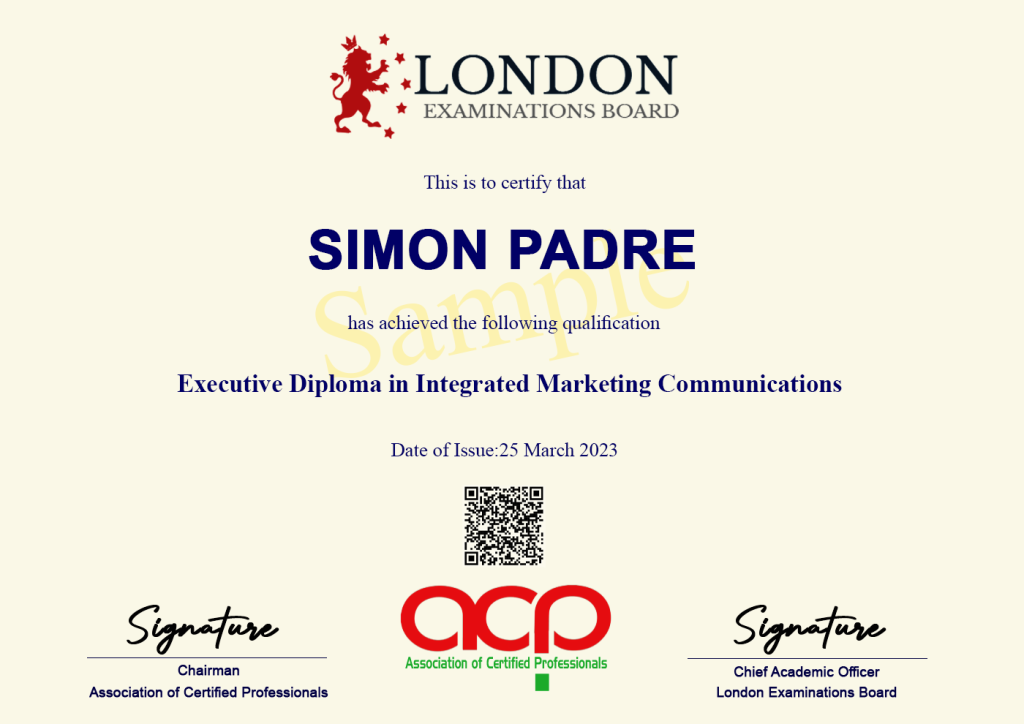PROGRAMME AIMS
This Executive Diploma in Integrated Marketing Communications is designed to provide a fundamental understanding of practices underpinning Marketing. It is designed to equip those who are keen to take up employment in marketing within the business sector. Those who are keen to further their education can progress on to either the Higher Diploma in Marketing or gain entry and acceptance into Year 2 of a Bachelor degree.
PROGRAMME STRUCTURE
The Executive Diploma in Integrated Marketing Communications comprises of three modules. Executive Diploma in Integrated Marketing Communications is a professional diploma delivered in a manner that gives you the flexibility to learn at a time and place that suits your personal and work life. You can embark immediately on an Executive Diploma in Integrated Marketing Communications knowing you can fit it into your schedule.
3 core modules 60 credits
- Public Relations- 20 Credits
- Social Media Advertising- 20 Credits
- Marketing Promotions-20 Credits
DELIVERY MODE
Mode A: Blended Learning mode
Available at selected Approved Learning Centres where classes are held plus learners are given a complete set of learning materials to facilitate independent study which can be accessed through our designated Learning Portal.
For each module we recommend that Approved Learning Centres provide between 6 and 12 hours of lectures/tutorials and that you spend at least 12 hours learning online.
Mode B: Fully Online mode
Learners are given a complete set of learning materials to facilitate independent study which can be accessed through our designated Learning Portal. For each module, we recommend at least 24 hours of online learning.
ADMISSION CRITERIA
An applicant may be admitted on the basis of evidence to suggest that he or she will be able to fulfill and benefit from the objectives of the programme and achieve the standard required for the award.
Summary of Entry Requirements
No prior knowledge is required. Applicants should normally be at least 16 years old and preferably with the following:
- Level 3 (QCF/RQF) Certificate;
- 4 GCSEs at grade C or above; or
- Working adults.
Advanced Standing / Exemptions / Credits Transfer (APL)
Consideration for the above for learners admitted onto the programme may be considered either at the beginning of a programme, or beyond the beginning of a programme, through an assessment of that learner’s prior learning, whether certificated or un-certificated. The process for making such a decision is known as the Accreditation of Prior Learning (APL) is a matter of academic judgment exercised by the appointed panel considering applications and approvals of APL. Where cohorts of learners are to be admitted with advanced standing on a regular basis, the arrangement should be subject to an Academic Progression Agreement.
ASSESSMENT STRUCTURE
Comprehensive Multiple Choice Questions (“MCQs”)
The mode of assessment is a carefully designed MCQs consisting of 50 MCQs to be taken either online or in a proctored paper-based final examination at approved centres. The duration of this final assessment will be 1.5 hours. The MCQ will serve to validate the attainment of broad understanding and application of knowledge by learners is related to the intended learning outcomes.
UNIT SPECIFICATION
Participants will be awarded an Executive Diploma in Integrated Marketing Communication completion of the three Modules in Public Relations, Social Media Advertising and Marketing Promotion.
1. Public Relation
Learning Outcomes
On completion of this Module learners will be able to:
- Examine the various key concepts and principles relating to Public Relations.
- Analyse and apply the knowledge and ability to apply various techniques and tools used in Public Relations activities.
Topics covered include:
- Nature and purpose of Public Relations
- Public Relations and Organizations
- Communication, Research and Evaluation
- Customer, Media and Community Relations
- Global Public Relations
- Public relation strategies
- Future challenges
2. Social Media Advertising
Learning Outcomes
On completion of this Module learners will be able to:
- Examine and apply the various key concepts and principles relating to Social Media Advertising.
- Apply various techniques and tools to undertake effective Social Media Advertising.
Topics covered include:
- What is Social Media?
- What is Social Media Advertising?
- Why is Social Media Advertising Important?
- The Steps to Establish Social Media Advertising Strategy
- The various Social Media Channels
- The various tools for measuring activity of Social Media
- The Core Principles of Social Media Advertising
- Case Studies
3. Marketing Promotion
Learning Outcomes
On completion of this Module learners will be able to:
- Acquire key knowledge relating to the concepts, tools, principles, and practices relating to Marketing Promotion.
- Use the required models, tools, and techniques to ensure effective application of Marketing Promotion.
Topics covered include:
- How marketing promotion/communications work
- Target groups
- Advertising
- Media Planning
- Public Relations
- Sponsorship
- Brand Activation
- Direct Marketing
- Exhibitions and trade fairs
- E-communication

